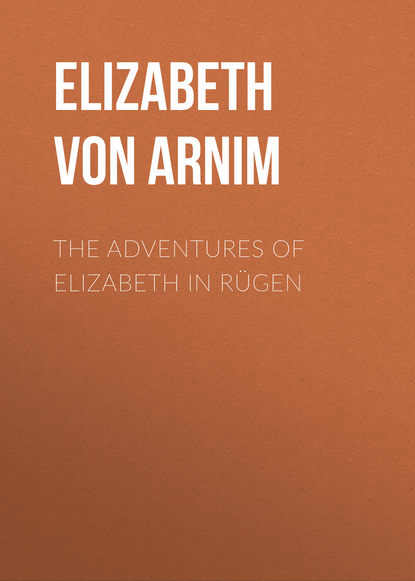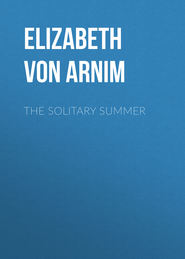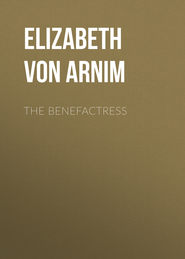По всем вопросам обращайтесь на: info@litportal.ru
(©) 2003-2024.
✖
The Adventures of Elizabeth in Rügen
Настройки чтения
Размер шрифта
Высота строк
Поля
'I shall destroy the film,' said he.
'It seems a great waste of films,' said I.
The young man lifted his cap; I continued my way among the rocks eastward; he went steadily in the opposite direction; round the other side of the hill we met again.
'Oh,' I cried, genuinely disturbed, 'have I spoilt another?'
The young man smiled—certainly a very personable young man—and explained that the light was no longer strong enough to do any more. Again in this explanation did he call me gnädiges Fräulein, and again was I touched by so much innocence. And his German, too, was touching; it was so conscientiously grammatical, so laboriously put together, so like pieces of Goethe learned by heart.
By this time the sun hung low over the houses of Putbus, and the strip of sand with its coarse grass and weatherbeaten trees was turned by the golden flush into a fairy bridge, spanning a mystic sea, joining two wonderful, shining islands. We walked along with all the radiance in our faces. It is, as I have observed, impossible to get away from any one on an island that is small enough. We were both going back to the inn, and the strip of land is narrow. Therefore we went together, and what that young man talked about the whole way in the most ponderous German was the Absolute.
I can't think what I have done that I should be talked to for twenty minutes by a nice young man who mistook me for a Fräulein about the Absolute. He evidently thought—the innocence of him!—that being German I must, whatever my sex and the shape of my head, be interested. I don't know how it began. It was certainly not my fault, for till that day I had had no definite attitude in regard to it. Of course I did not tell him that. Age has at least made me artful. A real Fräulein would have looked as vacant as she felt, and have said, 'What is the Absolute?' Being a matron and artful, I simply looked thoughtful—quite an easy thing to do—and said, 'How do you define it?'
He said he defined it as a negation of the conceivable. Continuing in my artfulness I said that there was much to be said for that view of it, and asked how he had reached his conclusions. He explained elaborately. Clearly he took me to be an intelligent Fräulein, and indeed I gave myself great pains to look like one.
It appeared that he had a vast admiration for everything German, and especially for German erudition. Well, we are very erudite in places. Unfortunately no erudition comes up my way.
My acquaintances do not ask the erudite to dinner, one of the reasons, as insufficient as the rest, being that they either wear day clothes in the evening, or, if worldly enough to dress, mar the effect by white satin ties with horse-shoe pins in them; and another is that they are Liberals, and therefore uninvitable. When the unknown youth, passing naturally from Kant and the older philosophers to the great Germans now living, enthusiastically mentioned the leading lights in science and art and asked if I knew them or had ever seen them—the mere seeing of them he seemed to think would be a privilege—I could only murmur no. How impossible to explain to this scion of an unprejudiced race the limitless objection of the class called Junker—I am a female Junker—to mix on equal terms with the class that wears white satin ties in the evening. But it is obvious that a man who can speak with the tongue of angels, who has put his seal on his century, and who will be remembered when we have returned, forgotten, to the Prussian dust from which we came—or rather not forgotten because we were at no time remembered, but simply ignored—it is obvious that such a man may wear what tie he pleases when he comes to dine, and still ought to be received on metaphorical knees of reverence and gratitude. Probably, however, if we who live in the country and think no end of ourselves did invite such a one, and whether there were hostesses on knees waiting for him or not, he would not come. How bored he would be if he did. He would find us full of those excellences Pater calls the more obvious parochial virtues, jealous to madness of the sensitive and bloodthirsty appendage known as our honour, exact in the observance of minor conventionalities, correct in our apparel, rigid in our views, and in our effect uninterruptedly soporific. The man who had succeeded in pushing his thoughts farther into the region of the hitherto unthought than any of his contemporaries would not, I think, if he came once, come again. But it is supposing the impossible, after all, to suppose him invited, for all the great ones of whom the unknown youth talked are Liberals, and all the Junkers are Conservatives; and how shall a German Conservative be the friend of a German Liberal? The thing is unthinkable. Like the young man's own definition of the Absolute, it is a negation of the conceivable.
By the time we had reached the chestnut grove in front of the inn I had said so little that my companion was sure I was one of the most intelligent women he had ever met. I know he thought so, for he turned suddenly to me as we were walking past the Frau Förster's wash-house and rose-garden up to the chestnuts, and said, 'How is it that German women are so infinitely more intellectual than English women?'
Intellectual! How nice. And all the result of keeping quiet in the right places.
'I did not know they were,' I said modestly; which was true.
'Oh but they are,' he assured me with great positiveness; and added, 'Perhaps you have noticed that I am English?'
Noticed that he was English? From the moment I first saw his collar I suspected it; from the moment he opened his mouth and spoke I knew it; and so did everybody else under the chestnuts who heard him speaking as he passed. But why not please this artless young man? So I looked at him with the raised eyebrows of intense surprise and said, 'Oh, are you English?'
'I have been a good deal in Germany,' he said, looking happy.
'But it is extraordinary,' I said.
'It is not so very difficult,' he said, looking more and more happy.
'But really not German? Fabelhaft.'
The young man's belief in my intelligence was now unshakeable. The Frau Förster, who had seen me disembark and set out for my walk alone, and who saw me now returning with a companion of the other sex, greeted me coldly. Her coldness, I felt, was not unjustifiable. It is not my practice to set out by myself and come back telling youths I have never seen before that their accomplishments are fabelhaft. I began to feel coldly towards myself, and turning to the young man said good-bye with some abruptness.
'Are you going in?' he asked.
'I am not staying here.'
'But the launch does not start for an hour. I go across too, then.'
'I am not crossing in the launch. I came over in a fishing-smack.'
'Oh really?' He seemed to meditate. 'How delightfully independent,' he added.
'Have you not observed that the German Fräulein is as independent as she is intellectual?'
'No, I have not. That is just where I think the Germans are so far behind us. Their women have nothing like the freedom ours have.'
'What, not when they sail about all alone in fishing-smacks?'
'That certainly is unusually enterprising. May I see you safely into it?'
The Frau Förster came towards us and told him that the food he had ordered for eight o'clock was ready.
'No, thank you,' I said, 'don't bother. There is a fisherman and a boy to help me in. It is quite easy.'
'Oh but it is no bother–'
'I will not take you away from your supper.'
'Are you not going to have supper here?'
'I lunched here to-day. So I will not sup.'
'Is the reason a good one?'
'You will see. Good-bye.'
I went away down the path to the beach. The path is steep, and the corn on either side stands thick and high, and a few steps took me out of sight of the house, the chestnuts, and the young man. The smack was lying some distance out, and the dinghy was tied to her stern. The fisherman's son's head was visible in a peaceful position on a heap of ropes. It is difficult as well as embarrassing to shout, as I well knew, but somebody would have to, and as nobody was there but myself I was plainly the one to do it, I put my hands to my mouth, and not knowing the fisherman's name called out Sie. It sounded not only feeble but rude. When I remembered the appearance of the golden-bearded Viking, his majestic presence and dreamy dignity, I was ashamed to find myself standing on a rock and calling him as loud as I could Sie.
The head on the ropes did not stir. I waved my handkerchief. The boy's eyes were shut. Again I called out Sie, and thought it the most offensive of pronouns. The boy was asleep, and my plaintive cry went past him over the golden ripples towards Lauterbach.
Then the Englishman appeared against the sky, up on the ridge of the cornfield. He saw my dilemma, and taking his hands out of his pockets ran down. 'Gnädiges Fräulein is in a fix,' he observed in his admirably correct and yet so painful German.
'She is,' I said.
'Shall I shout?'
'Please.'
He shouted. The boy started up in alarm. The fisherman's huge body reared up from the depths of the boat. In two minutes the dinghy was at the little plank jetty, and I was in it.
'It was a very good idea to charter one of those romantic smacks to come over in,' said the young man on the jetty wistfully.
'They're rather fishy,' I replied, smiling, as we pushed off.
'But so very romantic.'
'Have you not observed that the German Fräulein is a romantic creature,'—the dinghy began to move—'a beautiful mixture of intelligence, independence, and romance?'
'Are you staying at Putbus?'
'No. Good-bye. Thanks for coming down and shouting. You know your food will be quite cold and uneatable.'











